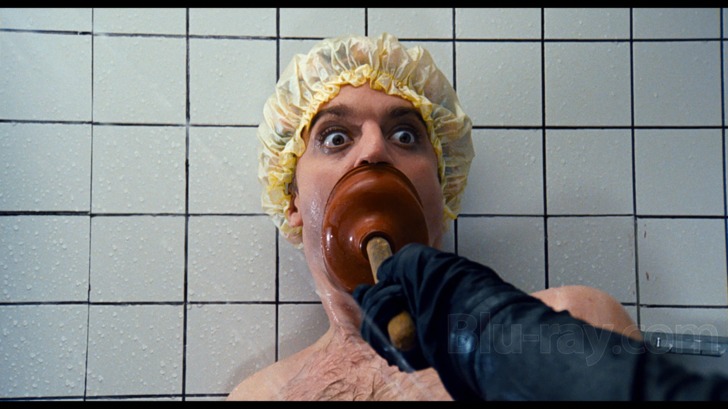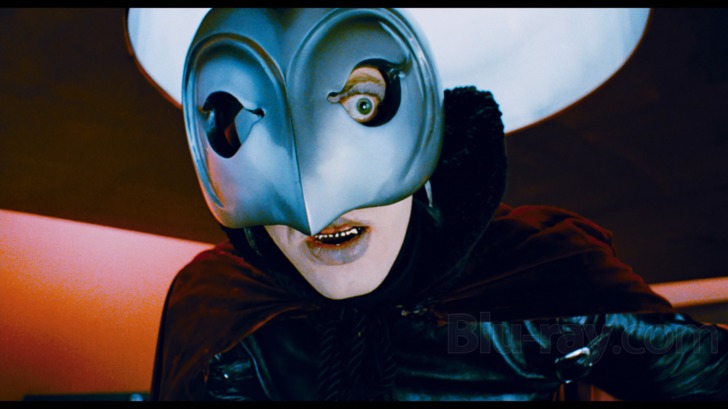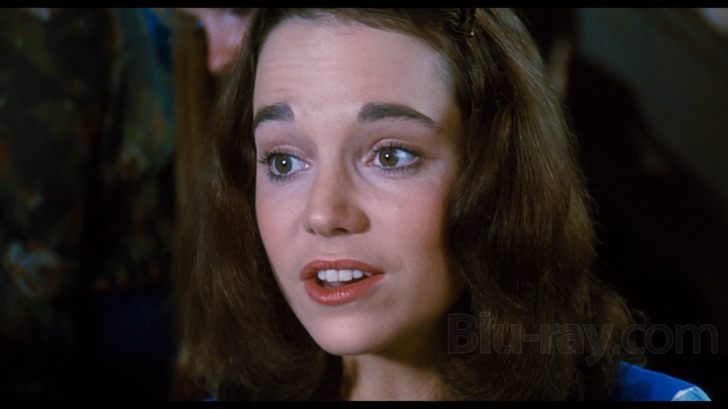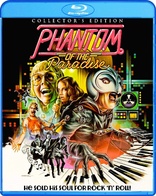Phantom of the Paradise Blu-ray Movie
HomePhantom of the Paradise Blu-ray Movie 
Collector's EditionShout Factory | 1974 | 92 min | Rated PG | Aug 05, 2014
Movie rating
7.9 | / 10 |
Blu-ray rating
| Users | 4.5 | |
| Reviewer | 4.0 | |
| Overall | 4.0 |
Overview
Phantom of the Paradise (1974)
In this glam rock variation on the famous 'Phantom of the Opera' story, Swan, a music business tycoon, steals the work of talented composer Winslow Leach, along with the object of his affections, aspiring singer Phoenix. Leach plans to get revenge, but his plans soon go horribly wrong and he ends up with a terrible facial disfigurement. Assuming a mask to hide his injuries and his identity, Leach's next move is to sign a pact with Swan to write a rock opera version of 'Faust' — a pact which is much more binding than he ever imagined.
Starring: Paul Williams (III), William Finley, Jessica Harper, Gerrit Graham, George MemmoliNarrator: Rod Serling
Director: Brian De Palma
| Horror | Uncertain |
| Music | Uncertain |
| Comedy | Uncertain |
| Fantasy | Uncertain |
| Musical | Uncertain |
| Thriller | Uncertain |
Specifications
Video
Video codec: MPEG-4 AVC
Video resolution: 1080p
Aspect ratio: 1.85:1
Original aspect ratio: 1.85:1
Audio
English: DTS-HD Master Audio 5.1 (48kHz, 24-bit)
English: DTS-HD Master Audio 2.0 (48kHz, 24-bit)
Subtitles
English
Discs
50GB Blu-ray Disc
Two-disc set (1 BD, 1 DVD)
Packaging
Slipcover in original pressing
Playback
Region A, B (C untested)
Review
Rating summary
| Movie | 3.5 | |
| Video | 4.0 | |
| Audio | 4.5 | |
| Extras | 5.0 | |
| Overall | 4.0 |
Phantom of the Paradise Blu-ray Movie Review
Swan song be damned.
Reviewed by Jeffrey Kauffman August 2, 2014Paul Williams is certainly one of the more unlikely multimedia stars of his generation. Elfin in appearance and kind of generally odd looking anyway, Williams also has a kind of nasal singing voice that’s unvarnished but hardly a technical marvel. And yet this diminutive sprite has managed to chalk up not just scores of film and television appearances, but innumerable hit records (albeit sung by other, perhaps more vocally gifted, artists). While Williams had already managed to carve out a few lesser acting roles by the time he made Phantom of the Paradise in 1974, he was already a show business phenomenon courtesy of his still impressive songwriting skills. Both on his own and with his frequent collaborator Roger Nichols, Williams had become the go-to hitmaker for such chart topping acts as The Carpenters (“Rainy Days and Mondays”, “We’ve Only Just Begun”) and Three Dog Night (“Out in the Country”, “An Old Fashioned Love Song”). Still, as even Williams himself seems to realize in the interview included on this Blu-ray as a supplement, he seemed like an odd choice to both provide the song score and star in Brian De Palma’s whimsical reimagining of a kind of mashup between The Phantom of the Opera and The Picture of Dorian Gray. Phantom of the Paradise’s song score is a pastiche driven amalgamation that runs the gamut from singer-songwriter confessional material to proto-fifties’ doo-wop outings, and neither of those idioms, nor anything else musical in the film, would seem to suggest Paul Williams as the perfect choice. But Williams had already begun to stretch musically, as evidenced by his facile lyrics for the criminally underappreciated pop-rock cantata Wings by the late French master Michel Colombier. (Colombier had a noted—no pun intended—if also underappreciated film scoring career, including the recently released Une Chambre en Ville.)

Interestingly, Williams isn’t initially seen in his role of Swan, an imperious record executive whose current acolytes The Juicy Fruits are a sensation. Instead, we hear Swan’s gravelly voice and occasionally see things like his gloved hand as he talks to his right hand man, Philbin (George Memmoli). After The Juicy Fruits leave the stage one evening, a hapless keyboard player named Winslow Leach (William Finley) sits down at the piano and begins singing a song from his unfinished cantata based on Faust. Swan is intrigued, feeling that Leach’s music is the perfect accompaniment for his planned opening of a new club called The Paradise. He instructs Philbin to get Leach’s music—but not Leach.
With a bit of sweet talking and a couple of vague promises, Philbin is indeed able to part Leach’s music from Leach, though the scene at least shows that Leach has a bit of an anger management problem. Leach is left with the distinct impression that he’s the focus of Swan’s star making proclivities, when of course nothing could be further from the truth. When Leach shows up at Swan’s estate during a huge audition filled with gaggles of scantily clad women, he first meets Phoenix (Jessica Harper), one of the hopeful young women standing in an inordinately long line to get the chance to perform for Swan. To Leach’s dismay, he soon discovers that the “auditions” are more of a casting couch opportunity (with Philbin, not Swan), and that Leach is persona non grata around the Swan enclave.
That at least alerts Swan to the fact that Leach is not going to just disappear into the woodwork, and he has his henchmen take care of the pesky lad, which culminates in Leach being sent to prison. There, the first of two appalling physical transformations take place when Leach’s teeth are removed and replaced with metal caps (part of a supposed “medical experiment”). Leach’s fragile psyche is already starting to shatter, and after he becomes aware the The Juicy Fruit’s new hit single is one of his tunes, he manages to escape one day after seriously injuring a guard. Heading straight for Swan’s Death Records, Leach goes on a rampage (in one of the more obvious referents to at least the 1943 version of Phantom of the Opera), and, just like the hapless composer in that tale, ends up horribly disfigured (this time courtesy of a record press instead of acid).
At this point Phantom of the Paradise veers from “operatic” canon by having Leach, who is now clad in a cape and bizarre, Storm Trooper-esque mask, actually confront Swan, who recognizes him and offers him a deal. Part of that deal is the elevation of Phoenix to the lead singer of Faust, but of course Swan is not one to honor his commitments, and once again Leach finds himself betrayed. Part of that betrayal is Swan’s use of a glam rocker named Beef (Gerritt Graham) in the lead role (it’s interesting that this plot point at least riffs on Phantom of the Opera territory, though the fact that different genders are involved may be at least somewhat indicative of an early seventies’ unisex ambience in rock).
Phantom of the Paradise might seem like an unlikely effort from the likes of Brian De Palma, but the film actually traffics in many of the same ideas that have informed some of his more commercially successful films like Carrie. Once again there’s a lonely outcast who’s specially “gifted”, and once again carnage explodes when the outsider isn’t given his or her due. While there’s no religious subtext here a la Carrie (unless one subscribes to the opinion that rock is religion), there’s a sinister melancholy that creeps through the film that seems to suggest that poor Leach has been abandoned not just by his fellow man, but by whatever Divine presence there may (or may not) be in the world. Finley delivers an amazing performance in this film, all the more remarkable in that virtually his entire face is hidden behind a helmet, and really only his mouth and one eye are visible. But the anguish and rage of this character are virtually palpable almost all of the time.
The film is a visual phantasmagoria, one of De Palma’s most hallucinogenically outrageous achievements in production and costume design. The finale of the film is like a rock concert being run by and attended by a pack of wild, peyote intoxicated, wolves. Through it all, Williams’ music (and even his voice—he serves as the singing voice of Leach) wends its way through innumerable genres as The Juicy Fruits change both their band name and their look (repeatedly). Williams was something of a “staff writer” at A&M Records, arriving at the label just as Carpenters were taking off to be the biggest act of the early seventies. While Williams disparages many of his tunes as mere “easy listening” fodder, his oeuvre during this period is really rather impressively diverse. This proved to be Williams’ second Oscar nomination (the first was for the prior year’s “Nice to be Around” from Cinderella Liberty, which Williams co-wrote with another Williams, John), and while he didn’t take home the trophy that year (Nelson Riddle received what was probably a “career Oscar” for The Great Gatsby), it’s probably Williams’ score that is one of Phantom of the Paradise’s most enduring achievements. You might even say the song score is devilishly good.
Phantom of the Paradise Blu-ray Movie, Video Quality 

Phantom of the Paradise is presented on Blu-ray courtesy of Scream Factory (an imprint of Shout! Factory) with an AVC encoded 1080p transfer in 1.85:1. This film has seen several European Blu-ray releases, including British and French, though for the purposes of this review, probably only the British release need be addressed for comparative purposes, as that was reportedly sourced from the same new(ish) high definition master Fox did on this title which evidently also served as the basis for this release. A cursory comparison of screenshots (I've tried to provide at least a few which come close to those in Svet's review of the Arrow release) shows that color timing has been tweaked on this new Shout release (as Shout's own Cliff MacMillan has indicated on our Forum). The overall look here is considerably brighter a lot of the time (compare the screenshots of Graham in the shower), but there's also a noticeably cooler color space a lot of the time which (to my eyes, anyway) seems more natural and less contrast boosted looking than the Arrow release. This might therefore be seen as a nice middle ground between the British and French releases, at least in terms of color timing. The transfer boasts richly saturated colors one way or the other, and also has a natural looking grain field which expectedly spikes during opticals (the film has a lot of split screen elements). Blacks are especially lush and deep throughout this presentation. The increased resolution of this presentation only points out a few inherent problems which were caused when the name of Swan's record label needed to be changed in post-production. These include some wavering matte lines and the like, but nothing is ultimately that distracting.
Phantom of the Paradise Blu-ray Movie, Audio Quality 

Phantom of the Paradise features DTS-HD Master Audio tracks in both 2.0 and 5.1 Amplitude on the 2.0 track seems anemic when compared to the 5.1 track, and there's simply no comparison when it comes to the music, which is much more vibrant, spacious and full of low end in the surround iteration. There are occasional moments of a kind of boxy phased quality in the 5.1 mix (listen to Rod Serling's opening narration for an example), but overall fidelity is superb, offering both the score and the dialogue with clarity and precision. Neither track has any problems to cause concern.
Phantom of the Paradise Blu-ray Movie, Special Features and Extras 

Shout! Factory has gone above and beyond with the supplements package on Phantom of the Paradise, offering a glut of special
features on
both the Blu-ray disc as well as an included DVD.
Blu-ray Supplements
- Brian De Palma Backstage at the Paradise (1080p; 33:07) is a really engaging interview with the film's writer-director. He talks about how he came up with the concept, and moves on to discussing the song score, casting (including a nice remembrance of William Finley) and the actual shoot.
- Paul Williams Soul Inspiration (1080p; 34:54) is an exceptionally informative interview with the film's star and composer. This makes an interesting, if somewhat repetitive, companion piece to the interview conducted by Guillermo del Toro which is found on the DVD (see below).
- Behind the Mask with Tom Burman (1080p; 4:09) is an interesting interview with the film's special effects supervisor, focusing on the weird helmet that Leach wears after he becomes The Phantom.
- Alternate Takes (1080p; 26:21) provides eleven different sequences, shown in split screen which shows how they appeared in the final version of the film as well as different angles and/or coverage for selected scenes.
- Swan Song (Outtake Footage) (1080p; 7:27) is an absolutely fascinating piece detailing the efforts in post production to remove any references to the original name of Swan's music enterprise. The name needed to be changed to Death Records after Led Zeppelin actually formed a Swan Song Records. This helps to explain the really goofy looking traveling matte that's quite obvious in Swan's press conference in front of his Lear Jet.
- Still Gallery (1080p; 13:50)
- Audio Commentary with Jessica Harper, Gerrit Graham and The Juicy Fruits (Archie Hahn, Jeffrey Comanor, and Harold Oblong AKA Peter Elbling). This is quite chatty, and tends to have a lot of "wow, do you remember that?" going on, but Harper gets into some details about working with Williams, whom she idolized for his music, and Graham talks about things like cinematography and lighting. As has been reported on our Forum, there's a brief overlap of separately recorded comments by Harper and Graham at around 1:11:06. It only lasts a few seconds, and serves mostly as a brief annoyance and/or wake up call to whoever was on QC for this particular item.
- Audio Commentary with Production Designer Jack Fisk is a bit more sporadic than the other commentary, but gets into a bit of the nuts and bolts of the design process.
- Paradise Regained (480i; 50:10) is a great documentary detailing a lot of the background and production of the film. This has great interviews with a lot of the principal cast and crew, and contains some hilariously trenchant observations about how desperate people are in Hollywood, to the point that some would happily sign a contract with Satan to ensure their success.
- Interview with Paul Williams Moderated by Guillermo del Toro (480p; 1:12:16) is a great piece, with del Toro obviously delighted to be talking to Williams. This covers a huge range of information in a wonderfully conversational manner.
- Interview with Costume Designer Rosanna Norton (480i; 9:34) is engaging enough, but was evidently sourced from a 2004 home video camera interview, so doesn't look particularly great.
- Interview with Producer Edward R. Pressman (480p; 19:03) finds Pressman reminiscing about his pre-existing relationship with De Palma, and how strongly he felt about Phantom of the Paradise from the get go.
- Interview with Drummer Gary Malaber (480p; 17:05) talks about touring with Williams and ending up in the film as part of the on screen band.
- Alvin's Art and Technique: A Look at the Neon Poster (480p; 11:36) is a neat little piece on the film's poster designer John Alvin, with interviews with his widow.
- Phantom of the Paradise Biography by Gerrit Graham (480p; 9:32) features Graham reading a biography/record review he wrote for the film's press kit.
- William Finley and Toy (480i; 00:33) is a brief piece with Finley showing a Phantom action figure.
- Radio Spots (2:34)
- TV Spots (480p; 5:19)
- Theatrical Trailers (480p; 5:07)
- Still Gallery (480p)
Phantom of the Paradise Blu-ray Movie, Overall Score and Recommendation 

I grew up thinking A&M Records was the absolute coolest label ever, and a big part of that was Paul Williams. Williams' own A&M outings are frankly a mixed bag, but the songs he provided to A&M artists like Carpenters, Lani Hall (whose "We Could Be Flying" on Wings is arguably one of her strongest post-Brasil '66 vocals) and Sergio Mendes (Williams' two tunes on the first Brasil '77 album "Pais Tropical" are pop masterpieces, in my not so humble opinion) remain some of the most tuneful, lyrically incisive work of that time period. Williams' song score for Phantom of the Paradise simply offers more proof of what an inventive songwriter he was (and continues to be, as his recent release of a song he wrote for the late Elaine Stritch confirms). But Williams is also unexpectedly visceral as evil music magnate Swan here as well, nicely balancing the unhinged but relatively more sympathetic Leach. De Palma's film glories in an appropriate excess, given the vagaries of the rock music industry, and Phantom of the Paradise, while probably a bit too chaotic for its own good, remains a distinctive entry in his filmography. This release boasts solid technical merits and comes jam packed with superb supplementary material. Highly recommended.
Similar titles
Similar titles you might also like

Poultrygeist: Night of the Chicken Dead
2006

The Love Witch
2016

Shanks 4K
Standard Edition
1974

Tone-Deaf
2019

The Satanic Rites of Dracula
Count Dracula and His Vampire Bride
1973

Theater of Blood
1973

Hellraiser
1987

The Comedy of Terrors
1963

The Hills Have Eyes
1977

The Last House on the Left
1972

Dracula: Prince of Darkness
Collector's Edition
1966

Fade to Black 4K
1980

Halloween 5: The Revenge of Michael Myers 4K
Collector's Edition
1989

The Blood on Satan's Claw
SOLD OUT
1971

The Baby
1973

Vampire's Kiss
MVD Rewind Collection
1989

The Raven
1935

Axe
Lisa, Lisa / California Axe Massacre / California Axe Murders / The Axe Murders / The Virgin Slaughter
1974

The Climax
1944

Queen of the Damned
2002
